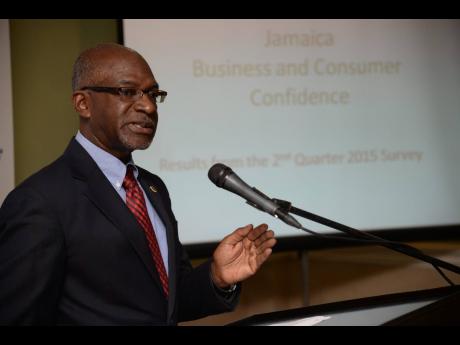Crime and COVID weighed on confidence in 2021
Consumer and business confidence swelled in the fourth quarter of 2021, compared to the previous quarter, but crime and COVID-19 continue to weigh on both groupings.
“I don’t want anyone to [think] that there was a surge in business confidence. It moved up in 2021, but it is nowhere near where it was in 2018,” said pollster Don Anderson, managing director of Market Research Services, during his presentation of the quarterly confidence indices on Tuesday.
Market Research conducts the confidence surveys on behalf of the Jamaica Chamber of Commerce, JCC. The fieldwork included 600 consumer respondents and 100 business respondents.
Anderson said that while confidence increased for both indices, it was still “fragile” due to the “alarming rate of criminality” and the uncertainty of the virus.
The business confidence index increased to 131.8 points in December 2021 from 121.7 points in September, 130.8 points in June, 115.2 points in March, and 128.3 points in December 2020.
The consumer confidence index increased to 160 points in December 2021 from 129.2 points in September, 149.8 points in June, 120.7 points in March 2021, and 131.8 points in December 2020.
Some 61 per cent of firms, up 22 percentage points, cited crime as the most critical problem the country currently faces. Unemployment, at 7.0 per cent; corruption, at 6.0 per cent; and vaccine hesitation, at 6.0 per cent, were also among the top challenges cited.
“Clearly, there is significant concern from both the consumer side and business side on the alarming rate of criminality – crime and murder in particular,” Anderson said in response to a query on the steps businesses were taking to address the criminality. “But as to what businesses are doing to seek to intervene or ameliorate the situation, I cannot say specifically,” he added.
Some 75 persons have been murdered since the start of the year, at a time when the country recorded one of its highest quarterly recovery growth rates.
“We are not surprised that crime management came out as the number one problem for businesses,” said President of the Jamaica Chamber Ian Neita.
Neita added that during the onset of the pandemic, one of the benefits of staff working from home was that it reduced contact with opportunistic crime.
“It is a major cost to us hiring security firms. But crime also affects our staff. During the pandemic, it served a little better when staff worked from home, because of the problems some face when leaving certain communities early in the morning.”
He noted that JCC members have cooperated with the Government to add on-premises cameras to the wider public network branded as Jamaica Eye. Also, the JCC chairs the Crime Monitoring and Oversight Committee, or CMOC, that liaises with the police force.
“There are certain crimes solved because businesses are cooperating and sharing the feeds from their cameras,” said Anderson.
The JCC also supports the call for stronger penalties for those convicted of illegal possession of firearms. But that’s not the solution, more needs to be done, Neita said.
“We know that the long-term solution has to do with social intervention, education and opportunities for the youth,” Neita said.
A number of sectors were negatively affected by the lockdown, especially entertainment which employs many youth. Additionally, many Jamaicans rely on remittances to enhance their income. Anderson said that in 2021, fewer survey respondents received remittances, at 29 per cent, compared to 35 per cent in 2020. It’s also the lowest level since Anderson started compiling that data set a decade ago.
His findings are at variance with the official remittance data compiled by the central bank, which shows that the volume and value of remittances are at record levels. Anderson said his data set implies that the flows are going to fewer persons.
He also noted that in 2021, only one-third of respondents stated that their remittance flows were unaffected by COVID-19.

